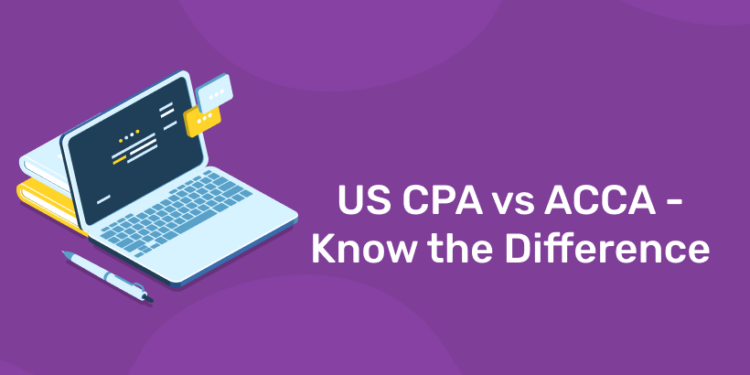Table of Contents
Accounting is a field that has endless job opportunities. It is an organization’s backbone. Accounting specialists are in demand in every business. It is critical to stay current with accounting and finance activities that occur within any firm. The demand for accounting specialists is increasing as the area of accounting expands. In order to work in the accounting industry, you must have remarkable skills. The ACCA and US CPA course are two of the highest certifications in accounting. These courses are collateral to each other as each of them provides extensive and in-depth knowledge in the field. The main difference between both the courses is that CPA is more about financial accounting, whereas ACCA is financial as well as management accounting. Both of these courses are highly qualified designation for professionals looking to make a career in accounting. The ACCA course is appropriate for candidates who want to pursue jobs in fields such as banking, auditing, consulting, taxation and law, etc. With a CPA course, a candidate can pursue jobs such as Finance Director, Personal Financial Advisor, Corporate Controller, Public Accounting, Tax Accounting, etc. All jobs that are available require a broad knowledge of the accounting
Knowing The Difference
Organization Structure
ACCA
- The Association of Chartered Certified Accountants, based in the United Kingdom, is the professional body behind the ACCA exam. It operates as a single entity with a much simpler application process.
- International candidates generally consider the certification as a global brand for financial professionals. In fact, many commonwealth countries highly regard ACCA.
US CPA
- In the United States, the CPA license is granted by each of the 55 jurisdictions, specifically by the state board of accountancy in each state and US territory. There is no centralized body, and each state has slightly different CPA exam and licensing requirements.
- Additionally, two professional bodies—the AICPA and NASBA—assist the jurisdictions in specific ways. But still, each state has the right to establish its own benchmarks. Therefore, international candidates are often confused and frustrated by the complicated application process.
Qualification
ACCA
- If you have more experience and/or education, you can start at the ACCA Qualification level. The ACCA’s exact requirements state that you can begin at this level “as long as you have 3 GCSEs and 2 A Levels in 5 separate subjects including maths and English.” Basically, this means you need a bachelor’s or master’s degree.
- However, if you only have a high school diploma, you can begin the ACCA Qualification exams if you pass the ACCA Advanced Placement Examination. This test analyzes your proficiency in the material that appears in the ACCA Foundations of Accountancy program.
- Unlike the US CPA, once candidates are registered, ACCA takes an active role in preparing you for the exam by providing study guides and sample exam papers. They also maintain a database of ACCA Approved Learning Partners.
- In addition to passing all papers for the ACCA Qualification, candidates must also take the Ethics and Professional Skills module. Additionally, they need to gain 3 years of appropriate work experience before calling themselves ACCA-certified.
US CPA
- Candidates must have a minimum of a 4-year bachelor’s degree and preferably a master’s degree to get a US CPA license. After all, almost all jurisdictions require CPAs to have at least 150 credit hours of higher education, equivalent to 5 years of full-time study (or a US master’s degree).
- Before you can even sign up to take the exam, your state board will review your educational background. Then, once you are approved for the exam and receive your Notice to Schedule (NTS), you are on your own to get prepared.
- Although several CPA Exam review courses can help you study, states don’t have their own CPA classes.
Exam Content and Format
ACCA
The ACCA Qualification has several smaller exams to pass, called “papers.” The ACCA exam is divided into 13 papers as follows
| Subject | Papers |
| Applied Knowledge | · Accountant in Business
· Management Accounting · Financial Accounting
|
| Applied Skills | · Corporate and Business Law
· Performance Management · Taxation · Financial Reporting · Audit and Assurance · Financial Management
|
| Strategic Professionals- Essentials | · Strategic Business Leader
· Strategic Business Reporting
|
| Strategic Professionals- Options | · Advanced Financial Management
· Advanced Performance Management · Advanced Taxation · Advanced Audit and Assurance · |
Candidates can apply to waive some papers based on their education levels. Or, they can take the “Certified Accounting Technician Qualification” assessment to waive some papers according to practical experience. However, please note that you can only receive a maximum of nine exemptions for the Applied Knowledge and Applied Skills papers. Plus, you cannot receive any exemptions for the Strategic Professional portions. So, all candidates must sit for those papers.
US CPA
- The CPA Exam has 4 parts: Financial Accounting & Reporting (FAR), Auditing & Attestation (AUD), Regulation (REG), and Business Environment & Concepts (BEC).
- The exam is 100% computerized consisting of multiple-choice questions and task-based simulations (similar to case studies). BEC has an additional section for written responses or short essays called Written Communications. Grading is mainly computerized, even for written communications.
- You can choose to take the 4 parts separately, 2 at a time, or even 4 at the same time. Although you had to wait for specific “CPA testing windows” in the past, you can now sit for the exam any time during the year. You take the exam at Prometric testing centers, which are located throughout the US and in Japan, South Korea, Brazil, and several European and Middle Eastern countries.
Start your International Accounting Journey with ACCA!
Conclusion – ACCA vs US CPA
1: Accounting provides information on
ACCA
- Recognized in UK and commonwealth countries
- One single entity with a simple application
- Low entry barrier: post-secondary education needed
- Exam only offered 4 times a year
- 500+ testing centers across the globe
- 13 papers
- 3-4 years to complete
US CPA
- Recognized in the US and anywhere with US regional offices
- 55 jurisdictions with complex licensing requirements
- High entry barrier: master’s level and/or 150 hours of higher education
- Exam offered year-round
- Exam sites in the US + multiple other countries
- 4 parts
- 12-18 months to complete exam, plus an additional 1+ years of work experience (more in some jurisdictions)











